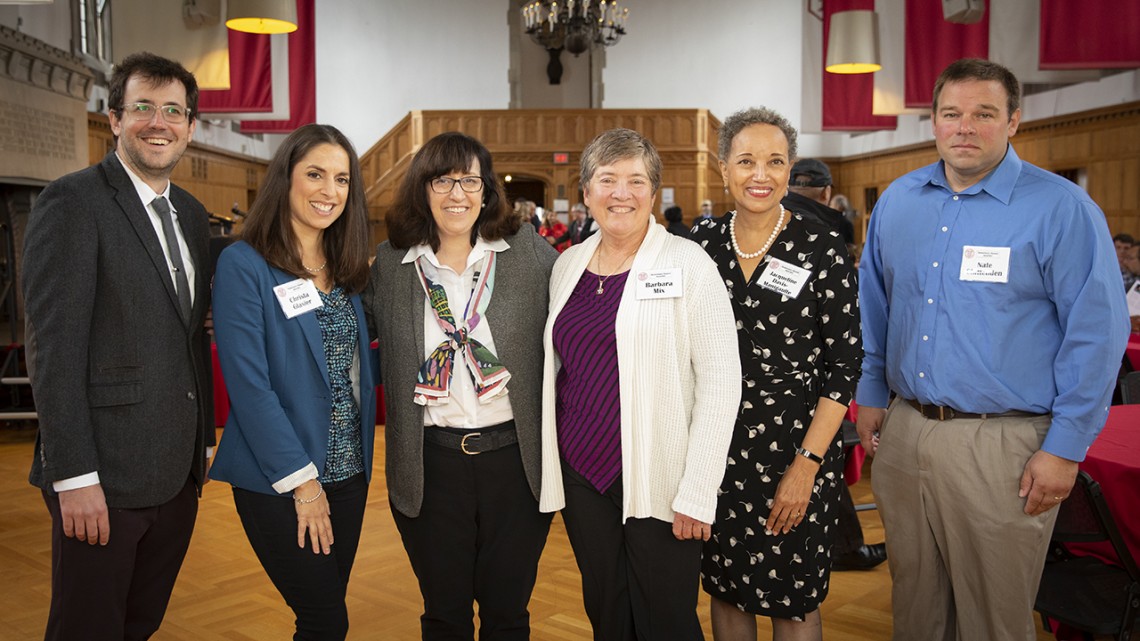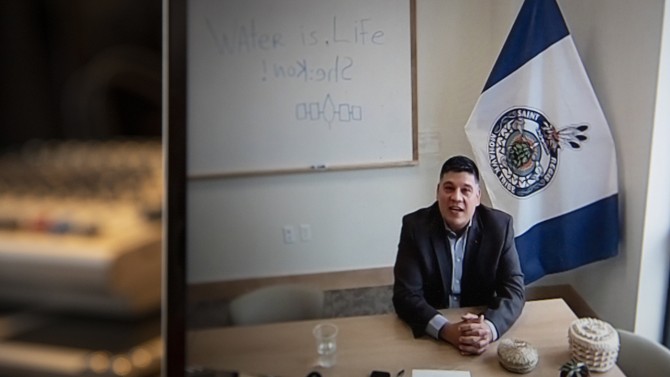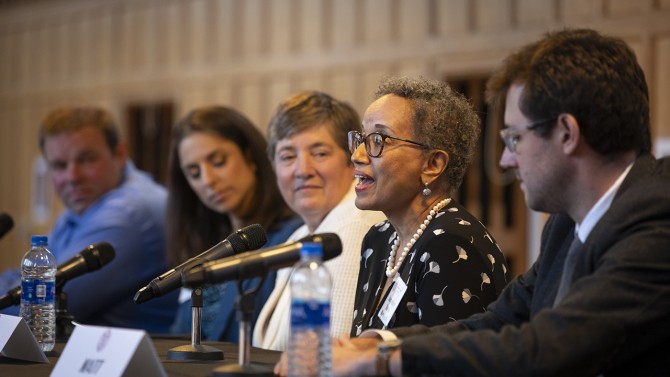
Cornell President Martha E. Pollack, third from left, poses with five of the first six winners of the Cornell New York State Hometown Alumni Award in the Willard Straight Hall Memorial Room Oct. 4. From left, Matthew Nagowski ’05; Christa Glazier ’01; Pollack; Barbara Mix, DVM ’82; Jacqueline Davis-Manigaulte ’72; and Nate Chittenden ’00. Not pictured is Tsiorasa Barreiro ’00, who joined the recognition ceremony via videoconference.
Hometown Alumni Award winners connect at Homecoming
By Joe Wilensky
The first six recipients of the Cornell New York State Hometown Alumni Award were honored at a special recognition ceremony Oct. 4 during Homecoming Weekend.
The event brought the alumni and their families together for a lunch, panel discussion and Q&A with university leaders, faculty, trustees and current students.
The award was launched in 2018 by Cornell’s Division of University Relations, in collaboration with Alumni Affairs and Development, to honor Cornell graduates who have returned to their home counties to start or enhance a business or nonprofit, and who regularly volunteer and are deeply engaged in their communities.
The first six awardees were:
- Tsiorasa Barreiro ’00 (College of Agriculture and Life Sciences), an Akwesasne native and executive director for tribal operations of the Saint Regis Mohawk Tribe. Barreiro previously worked for Cornell’s American Indian Program (now the American Indian and Indigenous Studies Program);
- Nate Chittenden ’00 (CALS), a third-generation dairy farmer who co-manages Dutch Hollow Farm in Columbia County with his brothers and parents. Chittenden is a local 4-H dairy leader and member of the Columbia-Greene Cornell Cooperative Extension Board of Directors;
- Jacqueline Davis-Manigaulte ’72 (College of Human Ecology), director of community relations and the family and youth development program leader for Cornell Cooperative Extension in New York City. Davis-Manigaulte has developed and enhanced programs that impact New York City residents, particularly youth, for more than 45 years;
- Christa Glazier ’01 (CALS), vice president of communications and marketing for the Syracuse-based CenterState Corporation for Economic Opportunity. Glazier previously worked in the district office of U.S. Rep. Jim Walsh, R-25th Dist., on environmental and immigration-related issues;
- Barbara Mix, DVM ’82 (College of Veterinary Medicine), a veterinarian at the Chemung County Veterinary Clinic who also runs her own large-animal practice. Mix developed the animal science program curriculum at the Greater Southern Tier BOCES and volunteers to foster and rehabilitate dogs; and
- Matthew Nagowski ’05 (ILR School), a group vice president at M&T Bank who also teaches statistical programming at Buffalo State College. Nagowski is a board member and former chair of Buffalo’s Partnership for the Public Good and former president of the Cornell Club of Buffalo.
Barreiro was unable to attend in person, but joined the panel via videoconference on a large screen.
“It is hard to imagine a more fitting event for Homecoming,” said Cornell President Martha E. Pollack, who welcomed the honorees. The award initiative is unique, she said, and also completely “consistent with who we are at Cornell. We want to recognize these wonderful alumni who have gone back to their communities and are having a positive impact there.”
“We talk about impact – this is the model that we should all be trying to follow,” said Joel Malina, vice president for university relations. “Giving back when and where possible for the common good. It’s the quintessential Cornell trait, and it’s embodied here in these six individuals.”
An important element of the recognition ceremony, Malina added, “is for the stories of these wonderful alumni to inspire our current students to pursue similar paths after graduation.”
Sharing stories of connection
The awardees shared their stories during the panel discussion, hosted by Gary Stewart, associate vice president for community relations.
Several, like Chittenden, grew up involved with 4-H and Cornell Cooperative Extension activities, where “community service is part of the deal,” Chittenden said. While he started at Cornell as a biology major, Chittenden said the diversity of people he met and their connections to their own home communities helped him realize that “there was nothing else I wanted to do but to go home and be on my family farm … working every day on that farm, you’re not isolated; you’re still a member of the community.”
Glazier shared how her natural resources major led her to communications and business economic development.
“It gave me a great solid foundation, and one of the things I took away was the depth and the diversity of the education, and the experience of the people that you meet,” she said. Working for Walsh in Syracuse, she found the immigration and housing work she did with community members rewarding; at CenterState CEO, she is “involved in so much of the community, from innovation programming to economic inclusion work and business development.”
Mix said much of her inspiration and passion in her veterinary work and teaching is rooted in wanting to pay forward the mentorship she received from local teachers and veterinarians when she was a teen and from her Cornell professors.
“I found out that I really like to teach,” she said. “I try to encourage [students]: ‘You can do it – you just have to be as stubborn as me.’ I cheer from the background and push them forward.”
Barreiro grew up around Cornell – his father worked in the university’s American Indian Program for almost two decades. “It really formed my appreciation for many of the issues going on in New York state tribes,” he said.
And the program fostered “the ‘full circle’ concept – native students, coming from our home reservations, and working at and being educated at Cornell, getting skilled and bringing those skills back full circle to our communities, to benefit our people,” Barreiro said.
Davis-Manigaulte, a child development and family studies major at Cornell, said her aim was always to return to her home community, New York City, after graduation. “I came here to learn as much as I could [to] help me fully be able to help people rise to their fullest potential,” she said. “I loved that I could take classes all over the university.”
She did work off campus in the Ithaca community and also became involved with student activism and protests during the turbulent late 1960s and early 1970s, working toward the creation of the Africana Studies and Research Center.
All those experiences “helped me develop skills that are skills I use as I’m doing the work that I do for Cooperative Extension today, where we take research-based knowledge and information and incorporate it into programming, based on the needs of the communities in New York City,” she said.
Nagowski said much of his Cornell education happened outside of the classroom, setting “a great foundation for continued professional and community success” after graduation. He said his Cornell experiences coalesced into themes around a results focus, connection with others, and resiliency, “making certain that what you’re doing in life is purposeful and what you’re doing has meaning and brings value to the people around you.”
Chittenden said that in meeting the other awardees and learning their stories, what most inspired him was “just how each of us, in our own different ways, found a way to get back in touch with the community that brought us here.”
Media Contact
Get Cornell news delivered right to your inbox.
Subscribe



